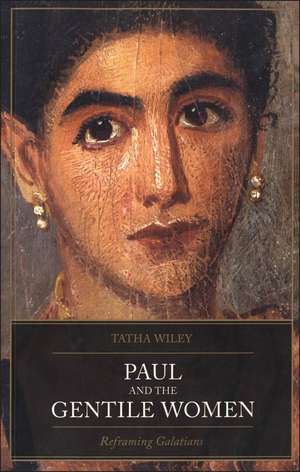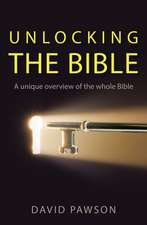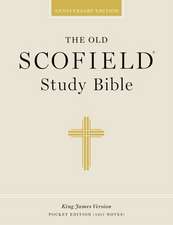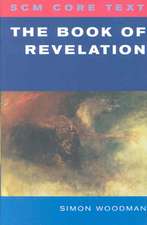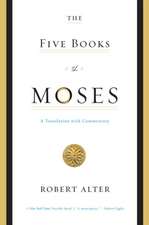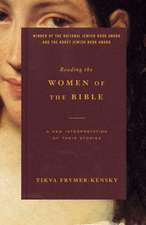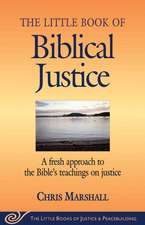Paul and the Gentile Women: Reframing Galatians
Autor Tatha Wileyen Limba Engleză Paperback – 30 apr 2005
Preț: 267.73 lei
Preț vechi: 346.61 lei
-23% Nou
Puncte Express: 402
Preț estimativ în valută:
51.23€ • 53.49$ • 42.40£
51.23€ • 53.49$ • 42.40£
Carte tipărită la comandă
Livrare economică 04-18 aprilie
Preluare comenzi: 021 569.72.76
Specificații
ISBN-13: 9780826417077
ISBN-10: 0826417078
Pagini: 168
Dimensiuni: 138 x 216 x 12 mm
Greutate: 0.22 kg
Ediția:Carroll & Graf
Editura: Bloomsbury Publishing
Colecția Continuum
Locul publicării:New York, United States
ISBN-10: 0826417078
Pagini: 168
Dimensiuni: 138 x 216 x 12 mm
Greutate: 0.22 kg
Ediția:Carroll & Graf
Editura: Bloomsbury Publishing
Colecția Continuum
Locul publicării:New York, United States
Recenzii
"Wiley here shows how a scholar coming to a text with a modern interpretative approach can draw out new and relevant insights. She brings to Galatians the new perspective of contemporary Pauline scholars...interesting and well-researched book." -Library Journal, 3/15/05
"This book is an important contribution to the study of Galatians. Wiley poses critical questions about the place of gender in the Galatians controversy. What is at stake for women and men in this controversy? What difference does it make today to be baptized into full membership in a Christian church? Wiley has given us the questions and an entry into a conversation that must continue." -World & World, Summer 2006
"This recent study of Paul's letter to the Galatians offers a thoughtful and provocative new angle on the intent and focus of Paul's debate with the Jerusalem Church. Tatha Wiley, who is at United Theological Seminary of the Twin Cities, Minnesota makes the case that the debate about circumcision in Galatians is about the importance of women's equality that Paul bases in the spirit of the ekklesia's embrace of Jesus as the Messiah. Paul's egalitarian commitment does not allow male members of the Galatian assembly to return to circumcision. To do so endangers the meaning of full and equal membership of all before god, particularly gender equality. Wiley's arguments offer better grounds for understanding the Torah and Paul's position that circumcision was not obligatory for Gentile converts. Recent studies of Diaspora Judaism also show evidence that supports the emergence of leadership roles for women in the Diaspora Synagogues. Paul's position therefore was in continuity with these Diaspora practices. Paul and the Gentile Women is a bold book and one that will stir others to return to the text and address the range of questions it unleashes about the early church, the divide between the public and private, Paul's teaching of ekklessia and its practice of liberty for all regardless of gender. What role did the destruction of the Second Temple in 70 CE play in the process that led to a reaction to gender equality and separation of the Jesus movement from Judaism is left to be explored more fully. This book is an excellent resource for undergraduate, graduate and seminary classes in New Testament and Pauline Studies. Particularly helpful is its feminist reading that makes visible the role of women and gender in the early church. The index and notes offer important guides for the argument. It is a rich synthesis of scholarship at the service of an original thesis."
"Although this is a scholarly work, it is readable and could be useful for serious lay students of the Bible. Recommended for church libraries that buy heavily in Bible study aids." - Church and Synagogue Library Association, Nov/Dec 2005
'gives...a vividly realistic picture of the religious state of affairs in the Galatian (modern mid-Turkey) congregations.' ~ Revd Leslie Houlden, Church Times, 14 July 2006
'A thought-provoking and solidly argued book that offers a very fresh reading of Galatians. In addition, her argument models a fruitful way of excavating what is below the surface of a text that could be applied to other issues in the church and society. This book will be useful reading for preachers, biblical scholars and interested lay people'
'This intriguing and well-written book looks at Galatians from a new point of view...Wiley makes her case skilfully and succeeds in encouraging the reader to look at Galatians from a fresh perspective.' ~ Gary Burnett, Vol 28.5, 2006
'The tensions between long-celebrated tradition and Paul's gender-neutral principle for membership and salvation are graphically and minutely descriped.'
'an excellent introduction to the recent discussion of Paul and his theology in view of the so-called 'new perspective' on Paul.' Christoph Stenschke, Themelios, 32/1
"This book is an important contribution to the study of Galatians. Wiley poses critical questions about the place of gender in the Galatians controversy. What is at stake for women and men in this controversy? What difference does it make today to be baptized into full membership in a Christian church? Wiley has given us the questions and an entry into a conversation that must continue." -World & World, Summer 2006
"This recent study of Paul's letter to the Galatians offers a thoughtful and provocative new angle on the intent and focus of Paul's debate with the Jerusalem Church. Tatha Wiley, who is at United Theological Seminary of the Twin Cities, Minnesota makes the case that the debate about circumcision in Galatians is about the importance of women's equality that Paul bases in the spirit of the ekklesia's embrace of Jesus as the Messiah. Paul's egalitarian commitment does not allow male members of the Galatian assembly to return to circumcision. To do so endangers the meaning of full and equal membership of all before god, particularly gender equality. Wiley's arguments offer better grounds for understanding the Torah and Paul's position that circumcision was not obligatory for Gentile converts. Recent studies of Diaspora Judaism also show evidence that supports the emergence of leadership roles for women in the Diaspora Synagogues. Paul's position therefore was in continuity with these Diaspora practices. Paul and the Gentile Women is a bold book and one that will stir others to return to the text and address the range of questions it unleashes about the early church, the divide between the public and private, Paul's teaching of ekklessia and its practice of liberty for all regardless of gender. What role did the destruction of the Second Temple in 70 CE play in the process that led to a reaction to gender equality and separation of the Jesus movement from Judaism is left to be explored more fully. This book is an excellent resource for undergraduate, graduate and seminary classes in New Testament and Pauline Studies. Particularly helpful is its feminist reading that makes visible the role of women and gender in the early church. The index and notes offer important guides for the argument. It is a rich synthesis of scholarship at the service of an original thesis."
"Although this is a scholarly work, it is readable and could be useful for serious lay students of the Bible. Recommended for church libraries that buy heavily in Bible study aids." - Church and Synagogue Library Association, Nov/Dec 2005
'gives...a vividly realistic picture of the religious state of affairs in the Galatian (modern mid-Turkey) congregations.' ~ Revd Leslie Houlden, Church Times, 14 July 2006
'A thought-provoking and solidly argued book that offers a very fresh reading of Galatians. In addition, her argument models a fruitful way of excavating what is below the surface of a text that could be applied to other issues in the church and society. This book will be useful reading for preachers, biblical scholars and interested lay people'
'This intriguing and well-written book looks at Galatians from a new point of view...Wiley makes her case skilfully and succeeds in encouraging the reader to look at Galatians from a fresh perspective.' ~ Gary Burnett, Vol 28.5, 2006
'The tensions between long-celebrated tradition and Paul's gender-neutral principle for membership and salvation are graphically and minutely descriped.'
'an excellent introduction to the recent discussion of Paul and his theology in view of the so-called 'new perspective' on Paul.' Christoph Stenschke, Themelios, 32/1
